
James Shigeta, who has died aged 85, was one of the very few Asian-American actors to have played big parts in Hollywood films. Born in Hawaii of Japanese ancestry, Shigeta broke through the barrier to screen stardom, bringing dignity and stature to his roles. Handsome and charismatic, with a rich singing and speaking baritone voice, Shigeta was cast in several films in which he was the equal of his co-stars, sometimes being permitted to have inter-racial screen romances, despite what amounted to a tacit prohibition in Hollywood.
Shigeta's breakthrough gradually helped to prevent the practice of actors such as Marlon Brando, Alec Guinness and Mickey Rooney playing Japanese characters with embarrassingly crude results. However, as was the Hollywood custom, Shigeta, often elevating poor material, was called upon to play Japanese, Chinese, Filipino and Polynesian characters, with the assumption being that audiences could not tell the difference.
One of six children, he was born in Honolulu. His father was a plumber. Shigeta conceived the ambition to become a singer after winning a talent competition on Ted Mack's The Original Amateur Hour. After singing in nightclubs in the US under the name Guy Brion, he enlisted in the US Marine Corps during the Korean war and served for two and a half years, singing for the troops and rising to the rank of staff sergeant.
After leaving Korea, Shigeta, who did not speak Japanese, went to Japan, where he became a success under his own name, singing on radio, television and on stage, and becoming known as the Frank Sinatra of Japan. Returning to the US, he starred in the Las Vegas revue Holiday in Japan.
He made his screen debut in Sam Fuller's The Crimson Kimono (1959) as a Japanese detective with the LA homicide squad, working with a Korean war army buddy (Glenn Corbett). While investigating a murder, they both get involved romantically with a key witness (Victoria Shaw). Fuller's potent, no-frills urban crime movie ends with a long kiss between Shigeta and Shaw, which prompted the legend on the poster: "YES, this is a beautiful American girl in the arms of a handsome Japanese boy!"
Racial conflict was the theme of James Clavell's Walk Like a Dragon (1960), an off-beat western in which Shigeta, with steely intensity, plays a pigtailed Chinese immigrant in the California of the 1870s, falling for a slave girl (Nobu McCarthy) who has been bought and freed by a white American (Jack Lord).
Cultural rather than racial tension is at the heart of Bridge to the Sun (1961), directed by Etienne Périer, a sensitive tale of the problems faced by a married couple in Japan during the second world war; she (Carroll Baker), an American used to western attitudes, he (Shigeta) a Japanese diplomat trying to get her to understand his countrymen's way of thinking. It was Shigeta's greatest role, the character painfully caught between his duty to his country and his love for his wife and child.
Despite his performance, there was still little likelihood of his being cast in an important role originally written for a white actor. In the event, Flower Drum Song (1961), adapted from the Rodgers and Hammerstein Broadway musical, was his last leading role, and one in which he headed an almost completely Asian-American cast. Set among the Chinese population in San Francisco, it dealt with the clash between two generations, with Shigeta representing a modern American wanting to choose his own wife. Despite the stereotyping, the colourful musical gave Shigeta a chance to sing the lovely ballad You Are Beautiful and join in the chorus of Chop Suey.
Most of the singing was done by Elvis Presley in Paradise, Hawaiian Style (1966), a semi travel commercial, in which Shigeta brought some gravitas to bear on the featherweight proceedings, as Elvis's business partner in a helicopter charter service.
With the lack of suitable feature-film roles, Shigeta found plenty of work on television, in series such as Naked City, Dr Kildare, Perry Mason, Ben Casey, Ironside and Murder, She Wrote. He also portrayed a doctor in eight episodes of Medical Center (1969-72).
His rare appearances on the big screen included a monk in the flaccid musical Lost Horizon (1973), in which he sang Living Together, Growing Together, one of the best songs of a bad lot; he was a member of the Japanese underworld in Sydney Pollack's The Yakuza (1974) and Vice Admiral Chuichi Nagumo in Battle of Midway (1976).
In the latter part of his big-screen career, Shigeta's most memorable role, though violently cut short, was in the box-office smash action movie Die Hard (1988), playing an executive, Joe Takagi, who is shot by a German terrorist (Alan Rickman) for failing to reveal a security code. Up to the killing, the tension builds unbearably, with Shigeta saying, "I'm telling you, you're just going to have to kill me," as Rickman reaches for his handgun.
Shigeta is survived by a sister, Barbara, and three brothers, Howard, Wilfred and Clarence.
• James Shigeta, actor and singer, born 17 June 1929; died 28 July 2014

